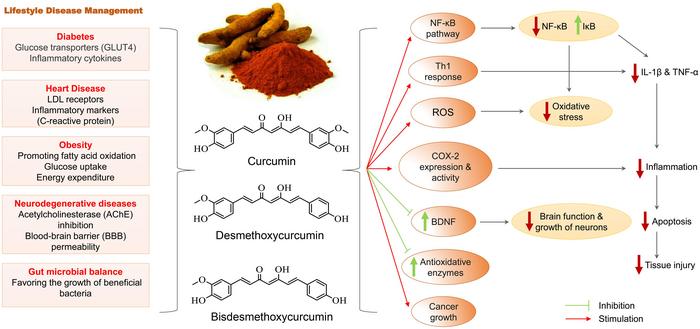Herbal-based nutraceuticals in the management of lifestyle diseases: experience from an Indian population

picture:
BDNF, brain-derived neurotrophic factor; COX-2, cyclooxygenase-2; IL-1β, interleukin-1 beta; IκB, nuclear factor kappa B inhibitor alpha; LDL, low-density lipoprotein; NF-κB, nuclear factor kappa B; ROS, reactive oxygen species; Th1, T helper type 1; TNF-α, tumor necrosis factor alpha.
vision Again
Credit: Anuradha Singh
Lifestyle diseases, also known as non-communicable diseases (NCDs), have emerged as a major health burden worldwide, including in India. These diseases, such as obesity, diabetes, hypertension, cardiovascular diseases, and metabolic disorders, are mainly caused by unhealthy lifestyle choices such as sedentary behavior, bad eating habits and stress. According to the World Health Organization (WHO), NCDs are responsible for 41 million deaths every year, which is 74% of all deaths in the world. Notably, 86% of these premature deaths occur in low- and middle-income countries.
The increasing prevalence of lifestyle diseases presents a major challenge to public health systems. Although modern medicine offers effective treatments, there are research gaps in areas such as long-term management, addressing the causes of poor health, and reducing the effects. This highlights the need for complementary and integrative approaches that combine conventional medicine with evidence-based natural therapies. Another promising approach is the use of herbal-based nutraceuticals, which offer potential benefits for managing lifestyle diseases. However, further research is necessary to establish their effectiveness, safety, and appropriate dosages for specific conditions.
Herbal-bAsed Nutraceuticals: A Viable Solution?
Herbal nutraceuticals are natural products derived from plants, which provide different health benefits than basic nutrition. They often contain bioactive compounds derived from plants traditionally used in Ayurveda, Siddha, and other Indian medicine systems. These traditional medical methods are important tools for the rural population due to their availability and less side effects compared to modern medicine. This has contributed to a revival of global interest in traditional medicine, including Ayurveda, Homeopathy, Siddha and Unani.
The Ayurvedic medicine market in India is estimated to be worth INR 50 billion (USD 6.25 billion) by 2023 and is expected to grow at a compound annual growth rate of 15-20% over the next five years. Factors driving this growth include increasing awareness of the benefits of Ayurvedic medicine, rising incomes, and prevalence of lifestyle diseases. The Indian government supports the Ayurvedic medicine industry, encouraging its growth through initiatives such as the National Mission on Ayurveda, Yoga, and Naturopathy. Despite the popularity of nutritional herbs, there is an important need to evaluate their effectiveness and safety in managing lifestyle diseases through empirical studies.
Growing Awareness and Use
The Indian population has undergone a major change in lifestyle, leading to a noticeable growth in healthcare. This has created a favorable environment for the adoption and adoption of nutritional herbs as effective and affordable solutions. Indian consumers are becoming increasingly aware of the potential benefits of these natural remedies, leading to their widespread adoption and use. This change reflects the growing awareness of the benefits of natural remedies and the desire for alternative health management methods.
Despite the widespread use of herbal supplements, it is important to choose high-quality supplements from reputable brands. Herbal nutraceuticals can interact with other medications, so it’s important to consult a health care provider before taking them. They are not a substitute for proper nutrition and lifestyle, which includes eating a balanced diet, regular exercise and effective stress management.
The ends
India has a rich tradition of using herbal remedies for various ailments, with knowledge and traditions passed down through the generations. Compared to conventional medicine, herbal remedies are often more readily available and cheaper, especially in rural areas with limited access to health care. Many herbal remedies are considered to have fewer side effects compared to pharmaceutical drugs, which makes them attractive to people looking for natural solutions.
Despite the many studies on herbal remedies, many do not have strong methods and strict scientific standards, which makes it difficult to make correct decisions about their effectiveness. The dosage of herbal products is still a matter of great concern due to differences in potency, purity and effectiveness. Collaborative research that combines traditional knowledge with modern science can pave the way for effective and sustainable treatments. Increasing public awareness of the potential benefits and drawbacks of these drugs is essential for responsible use and informed decision making. By exploring herbal nutraceuticals along with established medical practices, we can move towards a sustainable and sustainable way of managing diseases in India, paving the way for a healthy life and a bright future.
Full text:
https://www.xiahepublishing.com/2835-6357/FIM-2023-00055
A study recently published by Integrative Medicine of the Future.
Integrative Medicine of the Future (FIM) emphasizes basic and clinical research, including but not limited to randomized controlled trials, intervention studies, cohort studies, observational studies, qualitative and mixed methods, studies of animals, and systematic reviews.
Follow us on X: @xiahepublishing
Follow us on LinkedIn: Xia & He Publishing Inc.
Journal
Integrative Medicine of the Future
Article Title
Herbal-based Nutraceuticals in Health Management: Experience from an Indian Population
Publication Date of Articles
20-Jun-2024
Description: AAAS and EurekAlert! are not responsible for the accuracy of the content presented on EurekAlert! by participating in organizations or for the use of any information through the EurekAlert system.
#Herbalbased #nutraceuticals #management #lifestyle #diseases #experience #Indian #population